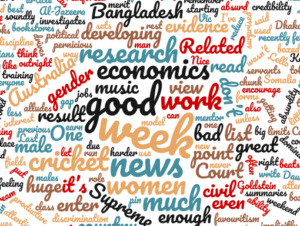Hi all,
Well, that was an eventful week of cricket, wasn’t it? Shortly after the West Indies finished their glorious chase against England (a triumph of Hope over expectation, as Vic Marks noted), Bangladesh gave Australia a huge – and hilarious – kick in the pants over in Dhaka. I was late to the office that morning, giggling uncontrollably as the wickets fell in procession, thinking about the delicious irony that Australia virtually excluded Bangladesh from their test cricket schedule because they weren’t competitive enough, only to run into the best all-rounder in cricket since Jacques Kallis. Combined with the welcome news that the greatest boxer of his generation was, in fact, good enough to soundly thrash a man who had never boxed before, it’s been a pretty good week for sport (here is the tale told in Emoji, the most appropriate medium).
- If only everything was so easy to separate into good news and bad news: is the news that the Supreme Court has nullified Kenya’s election result good or bad? One view expressed in this FT article is that “it has restored the integrity and credibility of the judiciary and taken our electoral democracy a notch higher”; another describes it as “a punch in the solar plexus” for an economy already on the ropes. Clearly, it’s great that the Supreme Court has the independence to issue such a verdict, but then we’re left with the conclusion that the first go round was compromised or they got it wrong. Neither one should make you happy.
- Brilliant VoxDev write-up of Dan Rogger’s work on developing country civil services. It’s structure closely mirrors the excellent talk he gave at DFID a couple of months ago, and if you missed it I strongly recommend that you catch up. Particularly useful for those of us who regularly engage with developing country bureaucrats and bureaucracies.
- Related: last week, I linked to some research on how giving evidence to Danish politicians doesn’t necessarily improve their decisions. Adnan Khan and co report on related (DFID-funded) research which sets out the limits to how civil servants use evidence, starting with their deeply inadequate ability to read even simple summaries of it and the non-existent interest of the political class in getting it right.
- Nice write up of research that investigates how training can reduce the ‘occupational segregation’ that drives so much of the gender pay gap (put simply, women don’t enter the most productive fields and as a result earn less – often due to forms of discrimination much more pernicious and harder to pin down than outright favouritism of males). A big chunk of this is down to aspirations, as previous work by Markus Goldstein also alludes to: women don’t enter typically ‘male’ jobs unless they have a male role model or mentor to encourage them. Related: Tyler Cowen comments on how little feminist economics is used by the mainstream, finding (implicitly) merit in the argument that the discipline is structurally biased against women (my own view is that like most of the rest of economics, it contains equal proportions sensible ideas and Beetlejuice-level crazy). And a huge reading list on gender and economics.
- Last week, I said competition matters. This week, a new paper attempting to find out how much you need for it to work.
- So, recently I’ve been thinking about our tendency to let the most attention-grabbing characteristic of a place dominate the way we think about them, even to the point of absurdity. The point was reinforced when I read this fascinating Al-Jazeera piece on the music of Somalia – I remember feeling briefly surprised that there was Somalian music, which is an absurd reaction.
- LitHub on some of the most beautiful bookstores in the world. One of my favourites, Daunt in Marylebone, is on the list, but nothing beats Livraria Lello.
Hope you had a great weekend, everyone!
R

